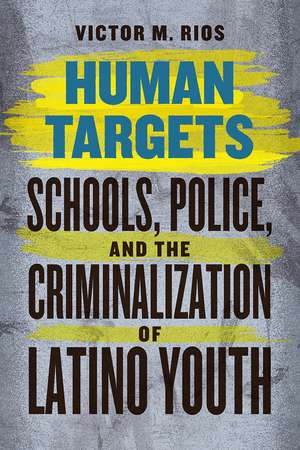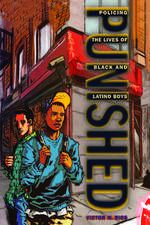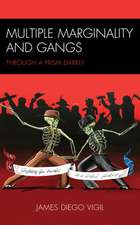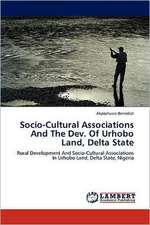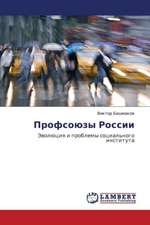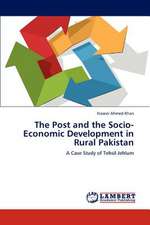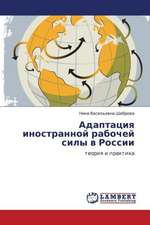Human Targets: Schools, Police, and the Criminalization of Latino Youth: Emersion: Emergent Village resources for communities of faith
Autor Victor M. Rios Cuvânt înainte de James Diego Vigilen Limba Engleză Paperback – 8 mar 2017
At fifteen, Victor Rios found himself a human target—flat on his ass amid a hail of shotgun fire, desperate for money and a place on the street. Faced with the choice of escalating a drug turf war or eking out a living elsewhere, he turned to a teacher, who mentored him and helped him find a job at an auto shop. That job would alter the course of his whole life—putting him on the road to college and eventually a PhD. Now, Rios is a rising star, hailed for his work studying the lives of African American and Latino youth.
In Human Targets, Rios takes us to the streets of California, where we encounter young men who find themselves in much the same situation as fifteen-year-old Victor. We follow young gang members into schools, homes, community organizations, and detention facilities, watch them interact with police, grow up to become fathers, get jobs, get rap sheets—and in some cases get killed. What is it that sets apart young people like Rios who succeed and survive from the ones who don’t? Rios makes a powerful case that the traditional good kid/bad kid, street kid/decent kid dichotomy is much too simplistic, arguing instead that authorities and institutions help create these identities—and that they can play an instrumental role in providing young people with the resources for shifting between roles. In Rios’s account, to be a poor Latino youth is to be a human target—victimized and considered an enemy by others, viewed as a threat to law enforcement and schools, and burdened by stigma, disrepute, and punishment. That has to change.
This is not another sensationalistic account of gang bangers. Instead, the book is a powerful look at how authority figures succeed—and fail—at seeing the multi-faceted identities of at-risk youths, youths who succeed—and fail—at demonstrating to the system that they are ready to change their lives. In our post-Ferguson era, Human Targets is essential reading.
In Human Targets, Rios takes us to the streets of California, where we encounter young men who find themselves in much the same situation as fifteen-year-old Victor. We follow young gang members into schools, homes, community organizations, and detention facilities, watch them interact with police, grow up to become fathers, get jobs, get rap sheets—and in some cases get killed. What is it that sets apart young people like Rios who succeed and survive from the ones who don’t? Rios makes a powerful case that the traditional good kid/bad kid, street kid/decent kid dichotomy is much too simplistic, arguing instead that authorities and institutions help create these identities—and that they can play an instrumental role in providing young people with the resources for shifting between roles. In Rios’s account, to be a poor Latino youth is to be a human target—victimized and considered an enemy by others, viewed as a threat to law enforcement and schools, and burdened by stigma, disrepute, and punishment. That has to change.
This is not another sensationalistic account of gang bangers. Instead, the book is a powerful look at how authority figures succeed—and fail—at seeing the multi-faceted identities of at-risk youths, youths who succeed—and fail—at demonstrating to the system that they are ready to change their lives. In our post-Ferguson era, Human Targets is essential reading.
Din seria Emersion: Emergent Village resources for communities of faith
-
 Preț: 144.99 lei
Preț: 144.99 lei -
 Preț: 133.99 lei
Preț: 133.99 lei - 9%
 Preț: 352.50 lei
Preț: 352.50 lei -
 Preț: 146.50 lei
Preț: 146.50 lei -
 Preț: 208.32 lei
Preț: 208.32 lei -
 Preț: 156.84 lei
Preț: 156.84 lei -
 Preț: 115.53 lei
Preț: 115.53 lei -
 Preț: 548.71 lei
Preț: 548.71 lei - 8%
 Preț: 346.31 lei
Preț: 346.31 lei - 8%
 Preț: 360.28 lei
Preț: 360.28 lei -
 Preț: 216.90 lei
Preț: 216.90 lei -
 Preț: 101.43 lei
Preț: 101.43 lei -
 Preț: 215.52 lei
Preț: 215.52 lei -
 Preț: 185.37 lei
Preț: 185.37 lei - 8%
 Preț: 563.24 lei
Preț: 563.24 lei -
 Preț: 179.04 lei
Preț: 179.04 lei -
 Preț: 106.35 lei
Preț: 106.35 lei -
 Preț: 138.81 lei
Preț: 138.81 lei -
 Preț: 273.93 lei
Preț: 273.93 lei -
 Preț: 127.89 lei
Preț: 127.89 lei - 9%
 Preț: 353.24 lei
Preț: 353.24 lei -
 Preț: 176.49 lei
Preț: 176.49 lei -
 Preț: 94.22 lei
Preț: 94.22 lei -
 Preț: 144.80 lei
Preț: 144.80 lei -
 Preț: 126.25 lei
Preț: 126.25 lei -
 Preț: 67.35 lei
Preț: 67.35 lei -
 Preț: 163.52 lei
Preț: 163.52 lei -
 Preț: 138.26 lei
Preț: 138.26 lei -
 Preț: 182.98 lei
Preț: 182.98 lei - 18%
 Preț: 502.35 lei
Preț: 502.35 lei - 18%
 Preț: 2261.34 lei
Preț: 2261.34 lei -
 Preț: 279.55 lei
Preț: 279.55 lei -
 Preț: 116.07 lei
Preț: 116.07 lei -
 Preț: 208.55 lei
Preț: 208.55 lei -
 Preț: 167.85 lei
Preț: 167.85 lei -
 Preț: 160.63 lei
Preț: 160.63 lei -
 Preț: 183.89 lei
Preț: 183.89 lei - 9%
 Preț: 352.77 lei
Preț: 352.77 lei -
 Preț: 307.55 lei
Preț: 307.55 lei - 12%
 Preț: 290.56 lei
Preț: 290.56 lei - 8%
 Preț: 311.68 lei
Preț: 311.68 lei -
 Preț: 120.81 lei
Preț: 120.81 lei -
 Preț: 229.92 lei
Preț: 229.92 lei - 6%
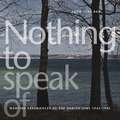 Preț: 324.95 lei
Preț: 324.95 lei -
 Preț: 145.41 lei
Preț: 145.41 lei -
 Preț: 152.07 lei
Preț: 152.07 lei -
 Preț: 186.09 lei
Preț: 186.09 lei - 18%
 Preț: 348.59 lei
Preț: 348.59 lei -
 Preț: 302.76 lei
Preț: 302.76 lei - 8%
 Preț: 565.01 lei
Preț: 565.01 lei
Preț: 182.22 lei
Nou
Puncte Express: 273
Preț estimativ în valută:
34.87€ • 36.27$ • 28.79£
34.87€ • 36.27$ • 28.79£
Carte tipărită la comandă
Livrare economică 14-28 aprilie
Preluare comenzi: 021 569.72.76
Specificații
ISBN-13: 9780226090993
ISBN-10: 022609099X
Pagini: 224
Ilustrații: 12 halftones, 12 line drawings
Dimensiuni: 152 x 229 x 18 mm
Greutate: 0.3 kg
Ediția:1
Editura: University of Chicago Press
Colecția University of Chicago Press
Seria Emersion: Emergent Village resources for communities of faith
ISBN-10: 022609099X
Pagini: 224
Ilustrații: 12 halftones, 12 line drawings
Dimensiuni: 152 x 229 x 18 mm
Greutate: 0.3 kg
Ediția:1
Editura: University of Chicago Press
Colecția University of Chicago Press
Seria Emersion: Emergent Village resources for communities of faith
Notă biografică
Victor M. Rios is professor of sociology at the University of California, Santa Barbara. He is the author of Punished: Policing the Lives of Black and Latino Boys and Street Life: Poverty, Gangs, and a Ph.D.
Cuprins
Foreword by James Diego Vigil
Introduction
Chapter One The Probation School
Chapter Two The Liquor Store and the Police
Chapter Three Cultural Misframing
Chapter Four Multiple Manhoods
Chapter Five The Mano Suave and Mano Dura of Stop and Frisk
Chapter Six Immigrant Targets
Conclusion From Culture of Control to Culture of Care: Policy and Program Implications
Methodological Appendix
Acknowledgments
Notes
References
Index
Introduction
Chapter One The Probation School
Chapter Two The Liquor Store and the Police
Chapter Three Cultural Misframing
Chapter Four Multiple Manhoods
Chapter Five The Mano Suave and Mano Dura of Stop and Frisk
Chapter Six Immigrant Targets
Conclusion From Culture of Control to Culture of Care: Policy and Program Implications
Methodological Appendix
Acknowledgments
Notes
References
Index
Recenzii
“Training his attention on social problems he himself experienced growing up—street violence, poverty, racism—Rios is an important and original voice. In this patient and insightful relational ethnography, Rios shows how gang-associated Latino youth, often written off as a ‘lost generation,’ contain multitudes of identities and brim over with promise. But broken schools and justice systems far too often blunt these children’s potential and contribute to casting them on the wrong path. Critically urgent and rendered in clear prose, Human Targets is a must-read book that asks more of us.”
“How do we move beyond the cycle of criminalization, violence, and mass incarceration that American society has been stuck in for the last several decades? Rios draws upon the perspectives of youth—the very ones most likely to be labelled, incarcerated, or killed—to provide insights to lead us out of our state of paralysis. Through his probing of their perspectives and experiences, Rios develops new and original ways of thinking about how to intervene, support, and alter outcomes for marginalized youth. Written in a style that is both rich in analysis yet still packed with an emotional fervor, Human Targets never allows us to forget that real lives are at stake even as it also provides hope that it is indeed possible to move beyond the dismal reality we find ourselves in.”
“Human Targets is a gripping, disturbing, and deeply moving ethnographic account of interpersonal street violence. Told from the author’s heart, it is based on careful interviews and his own personal observation. Human Targets is a provocative yet subtle analysis of the relentless social forces that too often undermine and frustrate the everyday lives of a major segment of America’s urban population. Extraordinary and important, this book is a must read for anyone seeking to understand the culture of the city today—it needs to reach a wide audience beyond the halls of the academy.”
